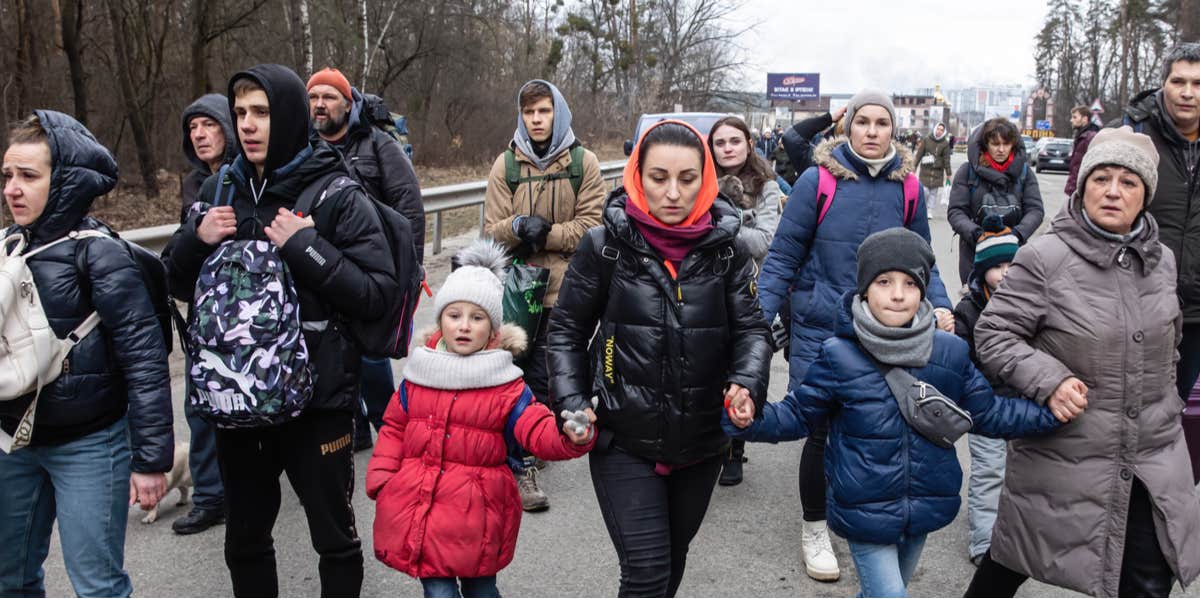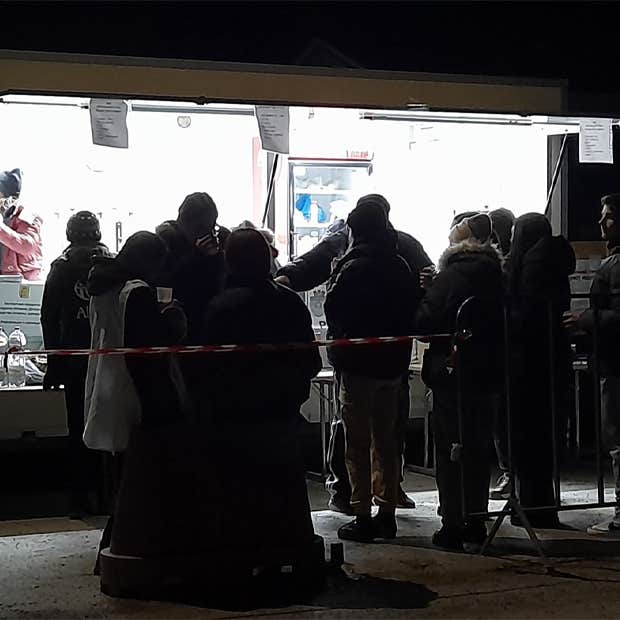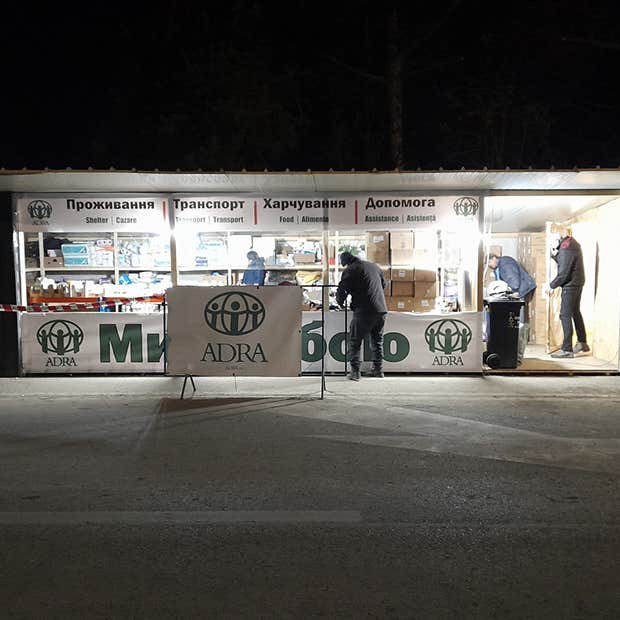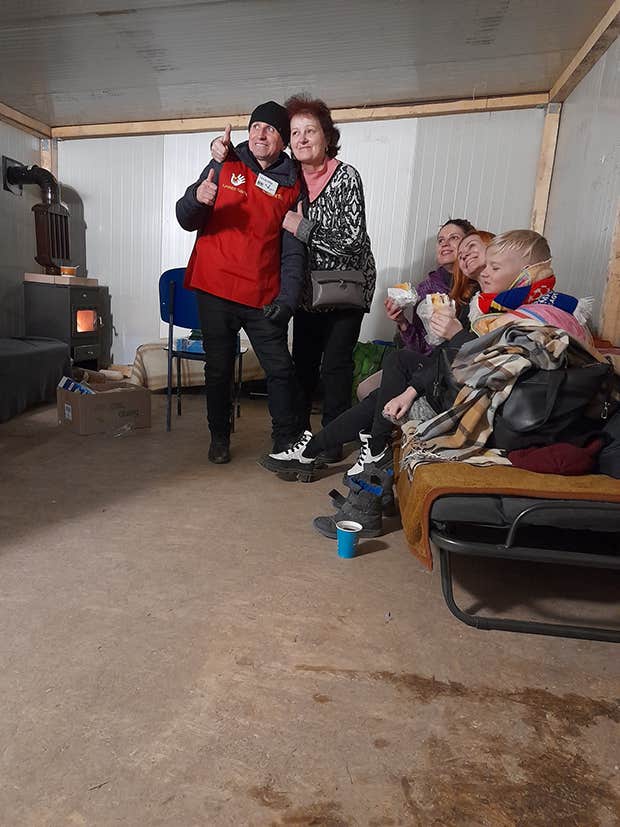4 Hours On The Ukrainian Border
I only saw a glimpse of what was hapening.
 Drop of Light / Shutterstock
Drop of Light / Shutterstock You show up at such a scene and feel like a fraud. Even though you’ve spent money on food, diapers, and toiletries, crossed borders, drove twelve hours, and have just dropped off your donation at an official refugee tent. You have volunteered some of your time to help refugees, but you already know that it pales in comparison to the sacrifices you see all around you at the Romanian-Ukrainian border.

Photo: Author
At the Siret border crossing, non-profit organizations and church group tents line the street welcoming refugees from war-torn Ukraine, offering food, shelter, transportation — anything they can provide. They are doing this service all day, every day.
I am here for four hours, mostly as an observer. Aside from adding to the stash that will be distributed to those in need (to refugees and those inside Ukraine), I am mostly in the way. I have arrived in between waves of incoming refugees, so I am offered soup and tea and bread — as if I have been displaced. Maybe my face looks lost and in need of assistance?

Photo: Author
“What do you do here?” I ask a teenager volunteering for ADRA.org, one of the two dozen groups stationed at the Siret, Romania border crossing.
“I meet the refugees at the buses where they are dropped off,” she says cheerfully. “I ask what they need and tell them what ADRA can provide.”
It could be a ride into Romania or elsewhere in Europe, a temporary or long-term place to stay, a bowl of soup or cup of tea, or simply a warm place to rest and drop off their luggage. She leads a group of refugees from the bus to the tent.
Two volunteers, Romanian men in their forties, get on their phones to organize rides to Suceava where their church is, or to the homes of those who have offered to house Ukrainians. Being in this refugee welcome tent is to see clearly the duality of war and peace; hate and love.
War has already killed and injured thousands in Ukraine, and millions have been forced from their homes in a matter of weeks. But what is the response here? Pure love, compassion, and empathy. The worst of humanity can bring out the best.

Photo: Author
In the corner of this makeshift shelter are seven suitcases bunched together. They contain the sole possessions of a family of five, but they are in good spirits. A teenage boy plays a game on his phone, most likely just under the conscription age of 18. His mother is smiley, presumably grateful that they are being assisted and maybe bewildered by the fact that she’s now considered a ‘refugee’.
Perhaps a similar realization makes another mother and son duo weary and silent. This is real. They have lost everything and now find themselves in a stove-heated shed with strangers on the side of the road in Romania.
Seven Ukrainian refugees spend a grand total of ten minutes in the shelter before two cars pull up and load their luggage and sort all of them into seats. I watch as they prepare to depart. A grandma in the front seat waves to me and says ‘Spasiba’ (Thank you).
I wave and smile awkwardly because I have done nothing helpful for this particular group. These Ukrainians are driven to a center where they will spend the night before finding a host in Romania or in various European countries who are welcoming Ukrainians with open arms.*
It’s freezing outside, so I end one of my border zone walks and wannabe photojournalism and return to the warmth of the ADRA shelter. It’s empty save for the two main guys in charge of arranging transportation. It’s quiet until a stocky American walks in unapologetically and asks, “Is there a guy named Walter here?”
I thought my colleagues were playing a joke on me because the night before (at a bar in Ruse) they’d asked me what my fake name was, just in case we wanted to amuse ourselves in mixed company. I said “Walter” and it caught on for an hour or two. So when this guy asked for ‘Walter’ I wondered ‘Wait, is this a joke? Am I supposed to go with this?’ Luckily I didn’t bite. “Any Americans here?” he asked.
I half-heartedly raised my hand. The guy sat next to me and introduced himself. Let’s call him Fred. I don’t want to give away Fred’s real identity because he proceeded to intensely inform me (or boast?) that he was smuggling medical supplies and miscellaneous defense items (body armor, tactical gear, and explosives) into the war zone.
‘It’s small scale, but I know how to get these things into Ukraine. I know what they need,’ Fred insisted.
He told me that he’d already spent $40,000 of his own money setting up a channel to funnel his supplies in and to get people out of Chervnitsi, Ukraine.
He said he’d crossed this border a half dozen times already and needed more funding, but his GoFundMe campaign had been mysteriously ‘suspended’. I didn’t know what to say. I wasn’t about to offer Fred any money — if that’s what he was hinting at.
This gets to the reason why two colleagues and I drove to the Ukrainian border in the first place. I’m here because I didn’t want to give money to a big NGO with one click online, unsure if even 30% of my donation would be directed toward Ukraine. I also didn’t want to buy canned goods, drop them in a box at work, and call it a day.
I wanted to put in real time and effort; to get directly involved; to know exactly where my offering went and, most importantly, to see what was needed on the ground so that any future help would be as relevant, direct, and useful as possible.
Tonight I’ve learned that Ukrainians fleeing the war are diverse in their needs. Some drive their own cars and have specific destinations in Europe where friends or family are waiting for them. Others are on foot and may or may not have a location to wait out this war.
They are the most desperate and vulnerable. One Ukrainian woman from Kyiv told me that she would stay in a town near the border with her two kids because she hopes that the conflict will end soon and she can return home. I hope she’s right.
There are now thousands doing this crucial work at border crossings in Romania, Poland, Hungary, etc. And the people around the world who are sending in their donations like crazy– it is truly heartwarming and inspiring. I’ve been humbled by it all.
And my only conclusion is to donate and volunteer more often when there’s a crisis in close proximity to me — no matter where those refugees are coming from. So now we have the contacts and better understand their needs.
We’ll be back.
Dominic Carrillo is a teacher and writer. His books and articles, including award-winning YA novels, are all available online. Living Beyond Borders, a YA anthology (Penguin, 2021) features one of his short stories.

